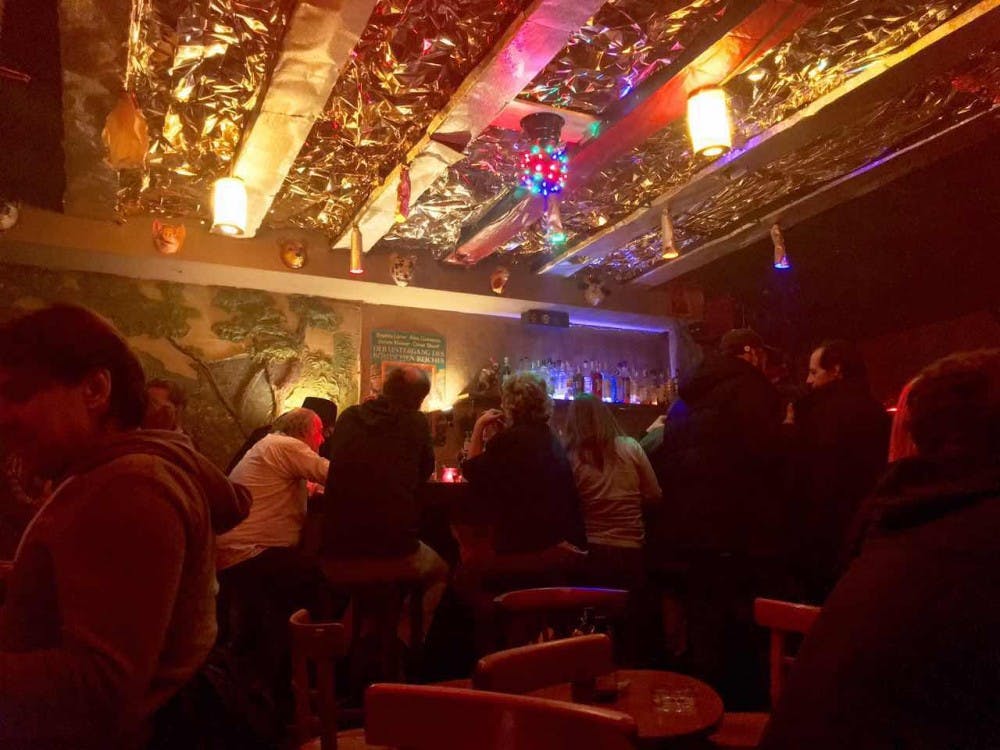This story is part of a series of stories written by student journalists who participated in UB’s Foreign Reporting study abroad program in Berlin, Germany this past winter.
It’s a Wednesday night in Berlin around 11 p.m. Lin Ye sits in the Sofia bar and rolls a perfect cigarette in a few seconds. Carbon dioxide makes the bar warm. Water vapor steams up the windows. A thin coil of smoke wafts toward the ceiling, which is covered in silver reflective paper, and colorful neon lights sparkle through the veil of smoke that hangs over the countertops.
“I come here almost every Wednesday, because the beer is on sale and because I am a smoker,” Ye said.
Laws enacted in 2007 and 2008 have made smoking illegal in most German bars and restaurants, but – in typical fashion – Berliners have creative ways to skirt the justice system and indulge in their favorite habit. At night, dozens of bars in each of the city’s 12 districts have named themselves “smoking bars.” After 9 p.m., the bars close their curtains, stop serving food and allow customers to smoke inside the bar.
The bars, the owners insisted and won in court, are more like private clubs than public spaces. In Germany, private clubs can allow smoking after 9 p.m. as long as no food is served and minors are not present.
“I like doing this, I’ve run this bar for 11 years,” said 44-year-old Spunk Seipel, who owns Sofia, as he hands a beer to a customer.
Seipel is a non-smoker. He doesn’t mind the smoke, which is another argument smoking bar owners make: if the employees don’t mind or are themselves smokers and the patrons want it, why should it not be allowed?
Individuals and business caught breaking the law by serving food or allowing smoking before 9 p.m. can be fined up to $1,200. But Berlin bar owners say they know of few instances of police writing fines. More likely, they insist, the police will be in the bars.
That’s partly because Germany has some of the least strict rules about smoking in Europe and because 39 percent of German men and 31 percent of German women, according to World Health Organization statistics.
In Berlin, the numbers are likely higher.
The Tobacco Atlas, produced by the World Lung Foundation, placed Berliners at the top of the list for smoking-related deaths, with 22.6 percent of men and 10.9 percent of women dying from complications related to cigarettes.
But not all Berliners don’t seem to care about the numbers. The anti-smoking laws, Seipel says, got imported from America and are not part of the German way of thinking
“We are different,” Seipel said. “When people think of America, they always think of an image of freedom. In reality, America is a prisoner of freedom.”
On a trip to New York last year, he was stunned to learn all the small daily freedoms that are illegal in America. He got stopped for carrying an open bottle of beer on the street, which is legal in Germany.
“We have a lot of freedom [in Germany],” he said. “Americans’ freedom is a liar.”
Roses, a small, cave-like bar in the eclectic, multi-cultural Kreuzberg neighborhood, responded to government policy and tried to change the bar into a non-smoking bar. However, after half a year, they lost customers, frequent visitors – smokers. So it reverted back to a smoking bar and is again booming.

“Smoking bars give a relaxed and chill environment where people can come to listen to nice music and drink nice drinks,” she said.
The jangle of conversation mixes with Bowie and other pop music. About 50 customers mingle and almost every one smokes a cigarette. The smoke forms shapes around their heads and hands and gives the bar an eerie hazy look.
“Actually I’m trying to quit smoking,” Zmiejko said. “But it is hard in this city. Cigarettes are accessible, cheap and very easy to get everywhere.”
She knows smoking is bad for her health, but she can’t bring herself to stop while everyone else is lighting up. She also thinks creating smoking laws is a waste of time as it can’t be enforced.
“I think police have better things to deal with than people smoking,” she said.
Esther Rychlik and Stephan von Rohdenon are on their first date on a cold January night. Rychlik, 26 is from the Western Germany city of Bonn and Rohdenon, 29, has co-founded Gigflip, an entertainment company that works with fans and artists in Berlin. The two drink – he Pimm’s, she a coffee-flavored cocktail – and they smoke. Her red lipstick stains the end of her thin cigarette.
“Smokers always want to talk to others smoking,” Rohdenon said.
He is proud of showing Rychlik this bar, a place where they can sit smoking together and calls it “a very nice atmosphere for people who want be independent.” Smoking, they said, helps love stories get started.
Not all bars are allowing smoking, however. Kevin Brown, a Californian, keeps his bar, Redwood in the chic Mitte neigbhorhood, consciously smoke-free.
“I wanted a quiet place to drink well-made cocktails in clean air,” Brown, 36, said.
And well-made cocktails don’t jive with smoke, he said. Smoke takes scent away, he insists. And part of the job of a great cocktail is its smell.
Plus, he said, “Smoking, especially in small bars in winter, leads to stronger hangovers.”
Smoking, however, is not solely a social activity, it is a culture embodied with Berliners. Helmut Schmidt, former Social Democrat chancellor of West Germany who died at age 96 in November, was a lifelong smoker who publically flaunted the no smoking laws by lighting up whenever and wherever he wanted.
“He is the only man you can find on public TV channels who is always smoking,” said Fritz Messer, a 21-year-old drummer, as he sat in Sofia.
In 1981, Schmidt got a pacemaker, but he still cheerfully lighted up a cigarette during an on-air interview broadcast in 2011. In 2008, when the smoking ban was introduced and Schmidt openly ignored it, German police tried to press charges, but the public prosecutor’s office insisted Schmidt’s smoking did not threaten public health and the case was dropped.
Berliners say they know smoking is unhealthy. But they also don’t care. They would rather enjoy the moment and cigarettes are part of their lifestyle.
“Nowadays, people are obsessed with health issues. Young generations care a lot,” Seipel said. But most of his customers, he says, are older and many of them smoked while holding their babies and don’t think it harmed the kids at all.
Also, he insists, working late, unstable hour and drinking beer is unhealthy too, but no one is banning bars.
He respects non-smokers out on the street and in public spaces and restaurants, but insists that when 9 p.m. hits his bar is a free zone. Customers who don’t like it, he says, can go elsewhere.
Rui Xu is a contributing writer. Questions and comments about this story can be directed to news@ubspectrum.com.





